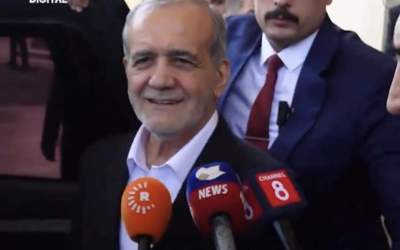Monday 13 April 2015 - 18:00
Story Code : 159884
Iran: West not allowed to speak with threatening voice in N. talks
"We negotiate on equal footing and with mutual respect and don�t allow the other side to participate in the negotiations with a hidden gun and in (military) boots," Director General for Political Affairs at the Iranian Foreign Ministry and nuclear negotiator Hamid Baeidinejad said, addressing a conference in Tehran dubbed 'from Geneva to Lausanne' alluding to the venues of the previous rounds of the nuclear talks between Iran and powers.
He underscored the necessity for the removal of all sanctions against Tehran, and stressed that "all the EU, US and UN Security Council sanctions will be terminated on the first day that final nuclear deal comes into effect", if any such agreement is struck between Iran and the six world powers.
Noting that "Iran holds no trust in the US", Baeidinejad said, "We only negotiate on equal footing."
He also emphasized Tehran's determination to continue Research and Development (R&D) activities after a possible nuclear deal with the G5+1, and said "Iran will continue nuclear fusion technology" even after a final deal with the powers."
In relevant remarks last week, Baeidinejad reiterated that despite a preliminary understanding over how to end their nuclear standoff, Tehran and Washington still hold their major differences over a set of other strategic and regional issues.
"The intention of the westerners and their media is evident; they are hostile to us and this (enmity) is not due to end. We have strategic differences with the West in the region and the Middle-East," Baeidinejad said.
Reiterating that Iran and the West held different positions on certain issues, he strong stressed that "the issue of Iran-US rapprochement has never been on the agenda of talks".
"We only take part in nuclear discussions; therefore, there are still many (other) differences" in place, he continued.
After nine days of hard work in Lausanne, Switzerland, Iran and the G5+1 reached an understanding on Thursday which laid the ground for them to start drafting the final nuclear deal over Tehran's nuclear energy program ahead of a July 1 deadline.
Reading out a joint statement at a press conference with EU foreign policy chief Federica Mogherini in Lausanne on April 2, Iranian Foreign Minister Mohammad Javad Zarif said according to the agreement, all the US, EU and UN Security Council sanctions against Iran would be lifted under the final deal.
"Our decision today that will be the agreed base for the final text of the Joint Plan of Action (the final deal) is of vital importance," Zarif said, reading the joint statement at the press conference.
"Now we can start drafting the final agreement and its annexations by relying on the solutions achieved in the last few days," he said after eight days of marathon talks with negotiators from the six world powers.
"As Iran continues its peaceful nuclear program, the degree and capacity of its enrichment and the size of its (enriched uranium) stockpile will be limited for specific periods and Natanz will be the only enrichment center in Iran. Nuclear enrichment R&D on centrifuge machines in Iran will be conducted on the basis of an agreed timeline and level."
Zarif said Fordo would turn from a nuclear enrichment plant to a nuclear, physics and technological center, where Iran will receive international cooperation.
The Iranian foreign minister also said the country's Arak Heavy Water Reactor would remain in place after being redesigned and renovated through international cooperation, stressing that the facility would remain a Heavy Water Reactor in nature, but would produce plutonium which wouldn�t have the capability to be used for nuclear weapons production.
He said "there won't be any reprocessing at the Arak facility and its consumed nuclear fuel will be sent" abroad.
"A collection of arrangements have been agreed for supervising the implementation of the contents of the Joint Plan of Action (final deal) which will include Safeguard Code 3.1 and voluntary implementation of the Additional Protocol (to the NPT); the International Atomic Energy Agency (IAEA) will also use modern inspection technologies and will be given more agreed access to verify past and present issues," Zarif said.
He said Iran would partner in international nuclear projects, "including power plant and research reactor construction as well as nuclear safety and security".
Zarif stressed that all sanctions against Iran will be lifted.
He said all UN Security Council sanctions resolution against Iran would be annulled as they did not help the settlement of the nuclear standoff between Iran and the six world powers.
"The EU will terminate imposition of its nuclear-related economic and financial sanctions and the United States will also stop implementation of its nuclear-related financial and economic sanctions simultaneous with the implementation of Iran's major nuclear undertakings in a way that they are verified by the IAEA," Zarif said.
Zarif said the final deal would be endorsed by a UN Security Council resolution in a move to annul all the previous nuclear-related resolutions against Iran.
He said drafting of the deal would start soon to prepare the Joint Plan of Action by the July 1 deadline.
By Fars News Agency
# Tags










